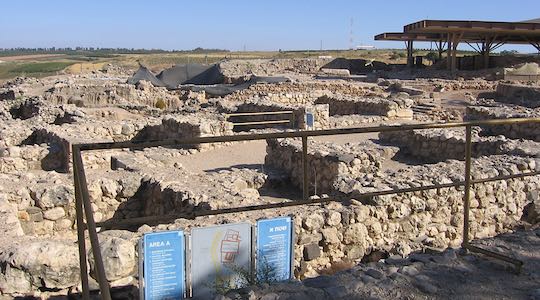I’m sure you will have read, and heard it said, that archaeology confirms the accuracy of the Bible. But you may also have heard from sceptics that the Bible isn’t historically accurate. So which is true?
This is a complex matter with a wide variety of conclusions among the experts. I have tried to investigate as impartially as I can, and it seems that both views are true (sometimes) …. and false (sometimes).
Here are seven statements I think can be known to be true.
1. Neither archaeology nor Biblical text tell us all we’d like to know
Archaeology has only discovered a small percentage of the material objects that once existed, which themselves are only one aspect of all that happened in the past. Similarly, the Biblical writers recorded only those events and ideas that were relevant to their purpose.
It is therefore obvious that both sources only give us incomplete information which must be interpreted. Some archaeologists (minimalists) dismiss the written record as legend and propaganda rather than history, while some historians (maximalists) are much more willing to accept the Old Testament text as a historical record. If we want to be fair and open-minded, we need to take account of both approaches, but be wary of the more extreme viewpoints.
2. The Bible writers knew about the times and places they wrote about …. mostly
There is plenty of evidence that the Bible writers, from the early Old Testament to the New Testament, generally got a lot of geography and customs right.
- Early Old Testament stories such as creation and the great flood, plus some of the Levitical law, seem to be developments of earlier ancient (Akkadian and Babylonian) myths and law.
- There a number of words and ideas in the Bible that reflect Egyptian language and customs, which would be the case if the Israelites spent a period of time in Egypt.
- Archaeology has revealed inscriptions and tablets that show that the stories of the patriarchs in Genesis accurately reflect names and titles, and many aspects of life and culture (e.g. treaties, marriage arrangements, inheritance and adoption) at the time.
- This continues on to the later Old Testament and into the New Testament, where Luke is regarded as an excellent ancient historian who accurately names and describes people and locations in Acts.
However some inaccuracies also occur, principally anachronisms, which probably occurred when stories were handed down orally and updated to be more meaningful to later generations.
- Sometimes people groups are referred to by names not in use at the time, but in general usage much later.
- The patriarchs are described as using camels, but the occurrence of camel bones in the archeological record shows camels didn’t appear in that area until later.
This evidence suggests the Bible stories go back to the times in which they are set, but of course it says little about the accuracy of the stories themselves.
3. Most of the good archeological evidence comes since the time of David
Check out the archaeological evidence offered by christian apologists, and you’ll find most of it comes from the first millennium BCE, that is from the time of the monarchy, the exile and return. Before the period of the monarchy, almost all evidence is circumstantial, relating to background information on geography and customs, and it is only after 1000 BCE that we start to get confirmation of Bible characters and events. For example:
- Bible History Daily offers evidence of 50 People in the Bible Confirmed Archaeologically, and every one of them is from within this period.
- The True Bible Teaching site offers 41 examples of archaeology confirming the Bible. Only 5 of these are in the 2nd millennium BCE, and only one of these refers to a Bible character or event (the rest are background), whereas the 30 dating from the first millennium include many references to events and Bible characters. The final 6 relate to the New Testament.
The books of the Bible were written at different times, by different authors with different purposes. It is fallacious to say the archaeological confirmation of the historical books of the first millennium BCE demonstrates the accuracy of the books which relate to the second millennium.
But at the same time, it is fair to say that there is good archaeological support for the period of the monarchy, captivity and return. For example (among many examples):
- Archaeology has shown that many cities mentioned in the Bible really existed. Examples include Shechem, Samaria, Shiloh, Gezer, Gibeah, Beersheba, and the Philistine cities of Ashkelon, Ashdod, Gaza, Gath, and Ekron
- King Hezekiah preserved Jerusalem’s water supply by tunnelling through rock from the Gihon Spring to the Pool of Siloam inside the city walls, and the tunnel is still there.
- Assyrian records confirm that Sennacherib besieged Jerusalem at the time of King Hezekiah and the prophet Isaiah, but was unable to capture it.
- The remains of royal buildings of Omri and Ahab, including the palace known as the Ivory House have been discovered.
- Various objects naming kings David, Jereboam, Jehoahaz, Jehoiachin and Zedekiah have been found.
4. We don’t expect many remains from nomadic people
Abraham, Isaac and Jacob are reported to have lived something like 4,000 years ago, and lived a nomadic life moving with their flocks to find pasture. Such people would have lived in tents, not unlike traditional Bedouins today (recognising that most Bedouins today don’t live in the traditional way). Such people didn’t leave behind many artefacts, created no monuments or stone buildings, and left no lasting written records or inscriptions.
It is therefore not surprising that, while we have information on the culture of that time (as described above), we have no confirmation of the events written in the early chapters of the Bible or of the main characters. The most we can reasonably say is that the stories are ancient and are based on a reasonable understanding of the culture, customs and geography.
Secular scholars believe these early stories were not written down until the middle of the first millennium BCE, but recognise that they were probably passed down orally for generations before then. Some scholars believe they are totally unhistorical, others that they are based on historical memories, but embellished to serve the purposes of later times (e.g. to bolster land claims), and only conservative scholars believe the stories are substantially historical.
5. The story of Moses and the Exodus is not well supported by the evidence
Moses is reported to have been a Hebrew who became an Egyptian prince, and later led about 2 million Israelites out of slavery in Egypt, an event which led to the destruction of all or part of the Egyptian army. You’d expect such an event to leave some mark on Egyptian history, and you’d expect if 2 million people camped somewhere for any length of time (as apparently occurred at Kadesh Barnea), they’d leave some trace.
But there is very little, if anything, in Egyptian history that describes these events, and it is difficult even to identify a time in Egyptian history when they took place. Perhaps the Egyptians didn’t record such a disastrous event, but whatever is the case, archaeology tells us virtually nothing about the Israelites in Egypt. However there are indications in the text that show familiarity with Egyptian names and customs, and the Egyptians did have slaves from Mesopotamia, so the story of the Israelites in Egypt isn’t implausible.
The lack of archaeological evidence for the journey across the Sinai and the encampment at Kadesh Barnea is a more serious issue, and the logistics of two million people travelling as a group make at least some aspects of the story doubtful. (If 2 million people travelled 100 abreast, 2 metres apart, the column would be 40 km long, and the last person would set off 10 hours after the first person.)
But there are some indications in the Bible that the numbers were much smaller (e.g. Exodus 23:29-30 and Deuteronomy 7:7 say the Israelites were few in number). If this was the case, then the lack of archaeological evidence would be understandable, and comparable to other historical migrations that have left little or no record.
Scholars are divided about the Exodus. Some think it happened more or less as described, and some think it is entirely fiction, but it appears that most think there is some historical reality behind the stories, but much is legend or exaggeration. A report on a recent conference on the topic concluded there was:
“considerable agreement that an Exodus event or series of events took place on a much smaller scale than the one depicted in the Hebrew Bible”.
These views present a difficulty for christians because the Exodus is one of the major events in Jewish history and a theme often referred to in the New Testament. We’ll look at this issue later.
6. The stories of the conquest of Canaan under Joshua seem to be exaggerated
Some significant archaeological evidence is available for this time period (sometime between 1200 and 1500 BCE), and while there is some support for an invasion, much of the archaeology does not appear to fully support the account in the book of Joshua.
- The archaeology of Jericho is much debated. Jericho is one of the world’s oldest cities, and was destroyed and rebuilt many times. Earthquakes were not uncommon in the area. The city was definitely conquered and destroyed by fire around this period, as outlined in Joshua, but there is no agreement on the exact date of this destruction, nor when Joshua might have been there, but it is possible that Joshua conquered a much smaller and less fortified city than existed earlier.
- The account in Joshua describes a short sharp campaign that led to the capture of the “cities” of Hazor, Lachish, Debir and Bethel (among others), and archaeology shows that all these were indeed destroyed in the 13th century. However the dates and details don’t always fit the timing of the Joshua account.
- For example, there is good archaeological support for the destruction and burning of the major city of Hazor (as shown in the photo at the start of this post) at the time of Joshua, but by no means universal support for the conclusion that the invading Israelites were responsible (e.g. there is a record of an Egyptian king claiming to have destroyed Hazor around this time).
- Other cities Joshua says were conquered may not even have existed at that time (e.g. Ai appears to have been destroyed long before and there is no evidence of a Bronze Age city at Hebron).
- There is archaeological evidence of a number of new small settlements beginning around the time of the invasion.
- Some cities (e.g. Libnah, Eglon and perhaps Heshbon) have not certainly been identified yet.
The picture is further confused by the fact that some cities that were apparently captured and destroyed in the early chapters of Joshua, are later in Joshua or Judges said to have not been destroyed, and their inhabitants are still Canaanites. (In fact, the first 12 chapters of Joshua tell a quite different story of rapid and total conquest, compared to the next 12, which tell of slower less violent assimilation with some fighting.)
DNA and archaeological evidence suggests that at least some, perhaps most, of the Israelites lived in Canaan all along, and simply moved to less settled areas, perhaps joining a group who did indeed travel from Egypt.
Thus there are various conclusions about Joshua, but perhaps the archaeology supports the fact of a smaller invasion augmented by local Canaanites joining the Israelites. This is such an interesting question that I’ll look at it in more detail in my next post.
The New Testament generally gets it right
We wouldn’t expect an itinerant Jewish teacher, miracle-worker and prophet, nor a small new religion, to leave much in the way of archaeology. And that is generally the case. But several discoveries show that the New Testament often describes the language, culture and people of the time accurately:
- John’s gospel describes a healing by Jesus at Bethesda, a pool with five covered colonnades near Jerusalem’s sheep gate. For many years nothing was known of the pool, but the remains of the pool (actually two connected pools) with the five colonnades have been found and identified. The narrative material in John is apparently more historically reliable than was once thought.
- Ossuaries (boxes to hold a person’s bones) has been found for high priest Caiaphas and, perhaps, James the brother of Jesus.
- The remains of houses and a farm in Nazareth have confirmed that this small village existed at the time of Jesus, contrary to those who have contested this.
- The gospels record Jesus preaching in synagogues in towns and villages throughout Galilee, however until recently synagogues were not known to have existed in the smaller villages and countryside. But recently the remains of a synagogue on a rural estate in Galilee were unearthed and dated to about the time of Jesus.
- “Archaeological inscriptions and other independent sources show that Acts contains accurate details of 1st century society, specifically with regard to titles of officials, administrative divisions, town assemblies, and rules of the Jewish temple in Jerusalem.” (Wikipedia)
Speaking the truth, keeping to the faith
I am an interested non-expert, and can only go by what the majority of the experts say. And I think the evidence leads to these conclusions:
- Saying “archaeology supports the Bible” or “archaeology doesn’t support the Bible” are both way too simplistic.
- Archaeology supports the historicity of the Bible in the period 1000 – 300 BCE, and lends some support for the New Testament.
- Archaeology can tell us little about the the book of Genesis beyond the geographical and cultural setting for chapters 12 onwards. Any decisions on historicity must be made on other grounds.
- Archaeology does not support the Exodus account, though it does little to directly undermine it either. An assessment of historicity depends mainly on other grounds, plus whether one believes “absence of evidence is evidence of absence”.
- Some aspects of the account of Joshua’s invasion of Canaan (mainly in chapoters 13-24) are supported by archaeology, but overall archaeology throws much of the account into doubt. There is clearly a historical basis for the accounts, but almost certainly some exaggeration, invention or misunderstanding.
How does this affect faith?
Christians who are dogmatically committed to the inerrancy, or at least historical accuracy, of the Bible, can welcome much of the archaeological information, but where secular experts conclude that an account isn’t fully historical, these christians have to believe that there are reasonable explanations for the apparent anomalies – e.g. locations haven’t been properly identified, dates are different to those currently accepted, etc.
But christians willing to follow the evidence can easily accept that God has revealed himself, not through a perfectly historical document, but through a human document written by people with different purposes than writing dispassionate history. God seems to have been willing to reveal himself through legends, folk tales, sagas and interpreted history, just as CS Lewis has said.
Some christians find this problematic. A particular issue is the Exodus, including the Passover, the giving of the Ten Commandments and the settlement in the “Promised Land”, because it is important for understanding the New Testament. Jesus and the apostles apparently accepted the historicity of these stories, or at least of the characters Moses and Joshua, though they were freer in their interpretation than christians today are.
This is a crucial matter for some christians, but others (including me) have no real problems, as their (our) faith is based entirely on the New Testament, especially the gospels. It seems quite reasonable to believe Moses and Joshua were historical figures though some of the stories about them are legendary and exaggerated, and this presents few problems for me.
I believe we should accept and understand the Bible as it apparently is, and not “require” God to have revealed himself in a way that we think he should. But I understand some christians are uncomfortable with this.
Read more
On this site
- What the scholars tell us about the Old Testament – contains copious references.
- CS Lewis on the Bible, history and myth
- Should christians accept everything in the Old Testament as truly from God?
Middle of the road assessments
- The Iron Age, Amihal Mazar. In The Archaeology of Ancient Israel. Amnon Ben-Tor (editor).
- History and Theology in Joshua and Judges. Dennis Bratcher.
- The History and Archaeology of the Book of Joshua and the Conquest/Settlement Period. Joel Drinkard
Jewish assessment
- Was There an Exodus? Joshua Berman, Mosaic
Christian (maximalist) claims
- Biblical Archaeology: Factual Evidence to Support the Historicity of the Bible, by historian Paul Maier (Christian Resreach Institute, 2009)
- Does Archaeology Support the Bible?, by Clifford Wilson (Answers in Genesis, 2008)
- How does archaeology support the Bible? (Got Questions.org)
- “The Archaeological Evidence for the Bible is Non-Existent!” (Probe, 2002)
- Archaeology Proves the Bible is True! (True Bible Teaching)
Sceptical (minimalist) claims
- Ze’ev Herzog and the historicity of the Bible (Noah Kennedy, 2015)
- Israeli archeologists’ discovery suggests the Bible is wrong about camels (Daily News, 2014)
- False testament: archaeology refutes the Bible’s claim to history – Criticism (Harper’s Magazine, 2002)
- (402) Modern archaeology conflicts with the Bible (1513 Reasons Christianity is False, 2017)
Photo: archaeological excavations of chambered gate at Hazor ( from the Israelite period CC BY-SA 2.0, Link). Hazor was one of the leading cities in northern Canaan. The book of Joshua records that its king Jabin was defeated by Joshua, and Hazor burnt to the ground. The book of Judges also records that Jabin of Hazor was defeated by Barak. Some scholars believe the same historical event has been recorded twice. Others believe that neither account is historical. There is evidence in the archaeology of violent destruction and burning which some say verifies the Biblical account, but others say the destruction was the result of civil strife.





Thank you for such a clearly stated explanation! I found it very interesting.
Thank you Brooke, that is very encouraging.
i believe it is true, to err is human. information is lost (oral). but thanks to the info that survived. the faith is still intact, and God’s existence certain
even if archaeology went on to prove that these things and people happened doesn’t prove that there is a God. It only proves the events and people who believed in one God. As an archaeologist do you question where did God come from. And if there is only one God how was only one lonesome God created? People say that the universe must have been created by something and so it must be God. But who created God? And Satan can wreak so much evil on Earth does that make him a type of God to have so much power? He is suppose to be a fallen angel. Where did the angels come from. If God created them for company then why did he bother creating earth and everything in it? Why did God create hell? The bible tells of events where God speaks to people such as Moses and Daniel and many others or he sends angels to speak to them. Why doesn’t he speak like that now? If Jesus died on the cross for the love of mankind and for our sins then why does he talk of a judgement day and the righteous entering heaven. Surely he died for all sinners even the worst of the worst. Not the righteous. Otherwise why bother going through all that suffering. It seems that Gods love is Conditional. We are told to love one another, love our enemies if we have any, turn the other cheek, forgive others, be compassionate, etc. Jesus talks often talks of woe to the unbelievers and woe be him that does this or that and talks of the final judgement whereby God will turn on those people without compassion, forgiveness or love and send them to a hell of damnation which is not a short punishment but forever and ever. What sort of God would do what he expects us on earth not to do to each other. He is then asking us, in our short few years on earth, to become better than him. That’s impossible. If its true then humans are doomed to carry on just as they are till the end of their time on earth because we cannot lift ourselves higher than God. God gives us free choice, but he doesn’t really because if the wrong choice is made there is an awfully high and horrid price to pay. His best choice for us to have is love me but fear me also. And do as I say not as I do. Does this not make God a needy God wanting our love and admiration and constant thanks. Would that not characterise him as a narcassistic being. I prefer to think that the bible, even if archaeologists find evidence of the events and people in it, used God to justify their own behaviours and often the power trips or mental illnesses they had. If Jesus was the son of God or/and man I prefer to think that he died for every sinner. Can you look at yourself, a loved one or even a total stranger and say ‘I love you so much that no matter what you do I’d hate to know you went to a forever hell?’ If you are truely full of Christian or Godly love you would say “No. Of course not.” So does that make your love for them greater than Gods love for them? It can’t because hes better than you. So I find the bible very difficult to come to terms with and that they are the words of men, not a God. The bible makes it hard for me to believe. I want to and I used to. But I’m a doubting Thomas. If thats a credible story also.
Hi Rosalie, thanks for writing your comment.
That’s a lot of questions, but I can see a theme there. You doubt if God’s as judgmental as some christians seem to say. You think he’s more loving than that. And I think I agree with you there.
There’s more than one way to read the Bible, and perhaps it would help you to read it in a different way. May I suggest you might like to read a few other pages here:
Reading the Bible in a different way
Understanding Jesus better
Does God send people to hell?
I hope you find peace about the questions you are asking.